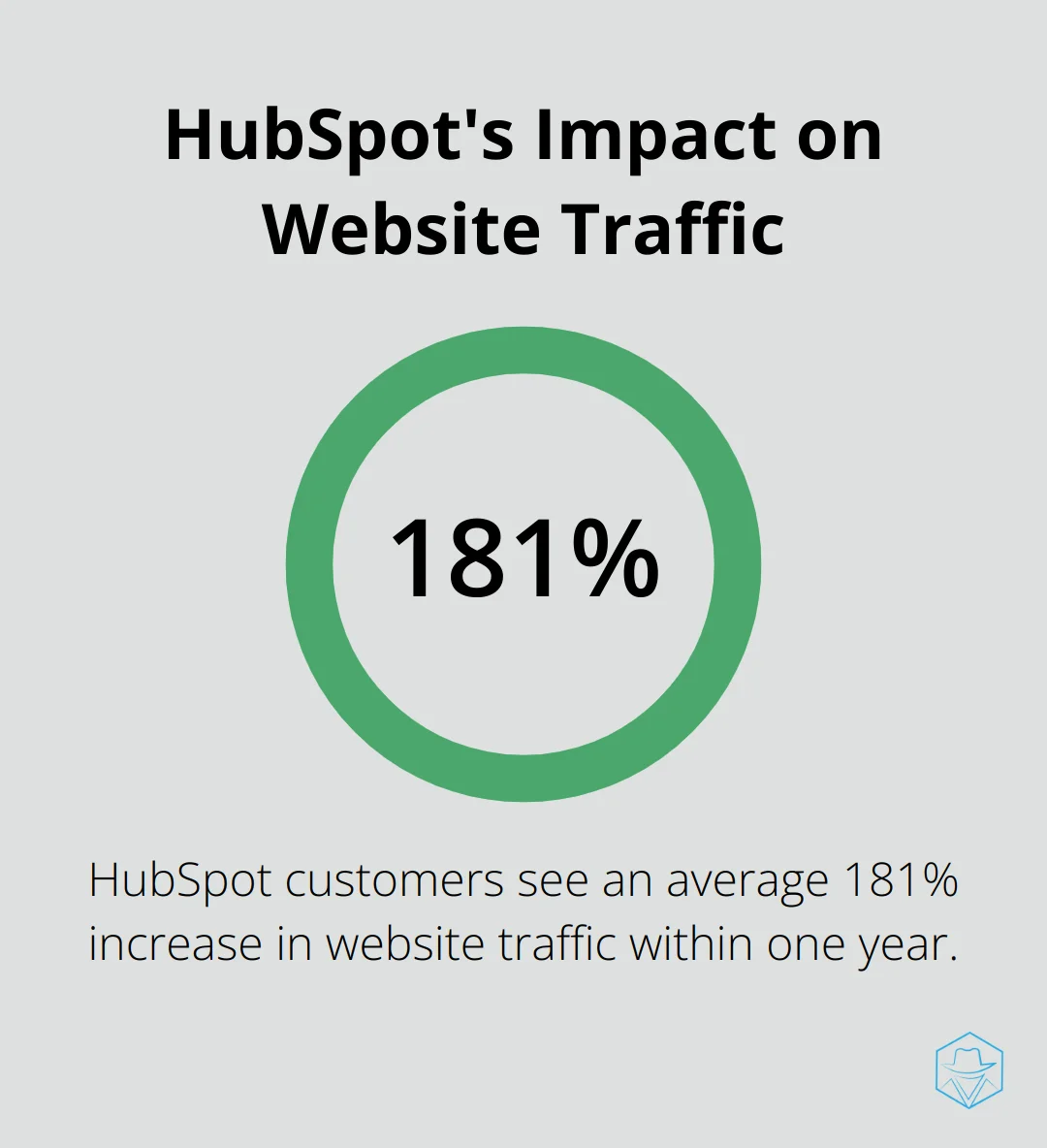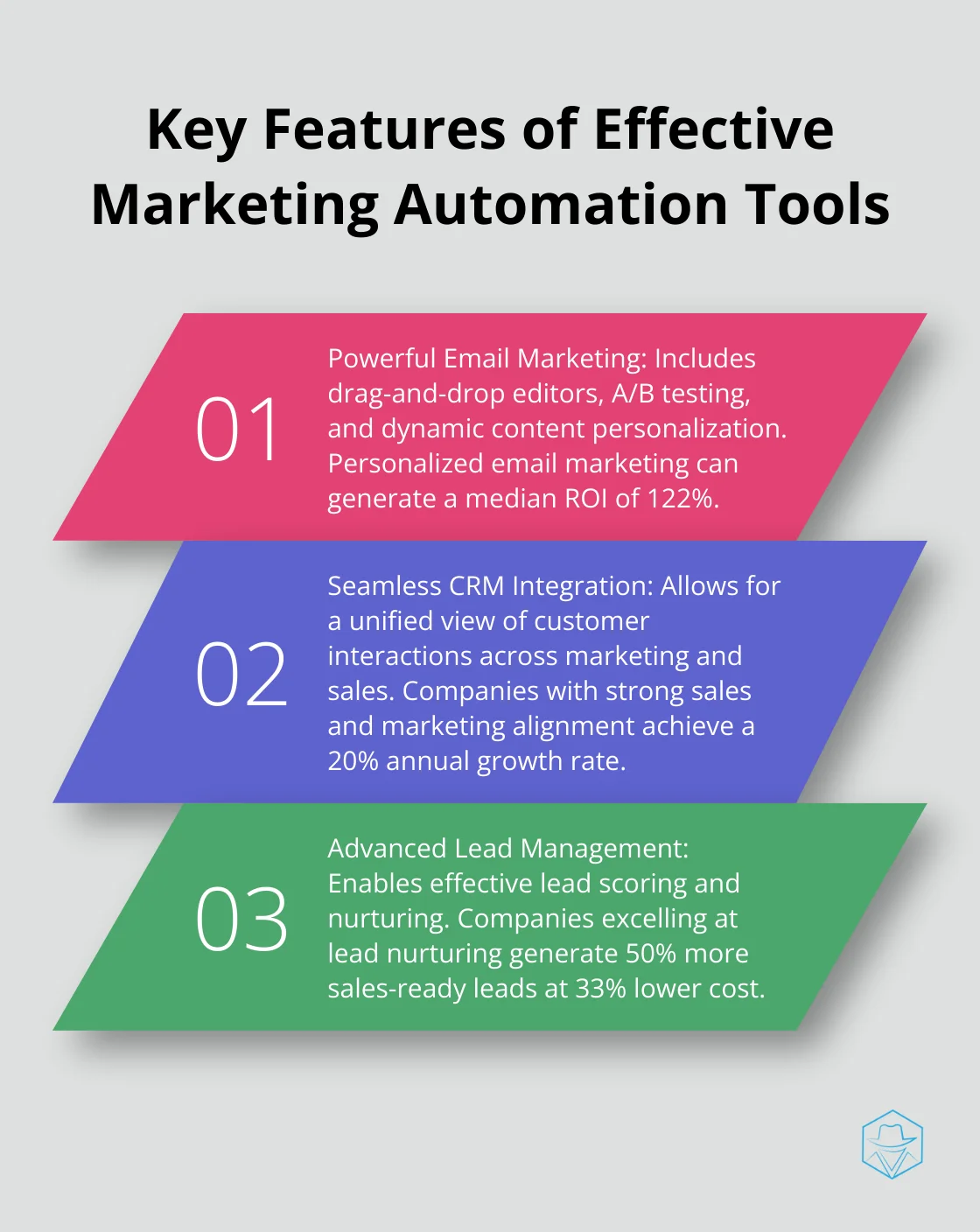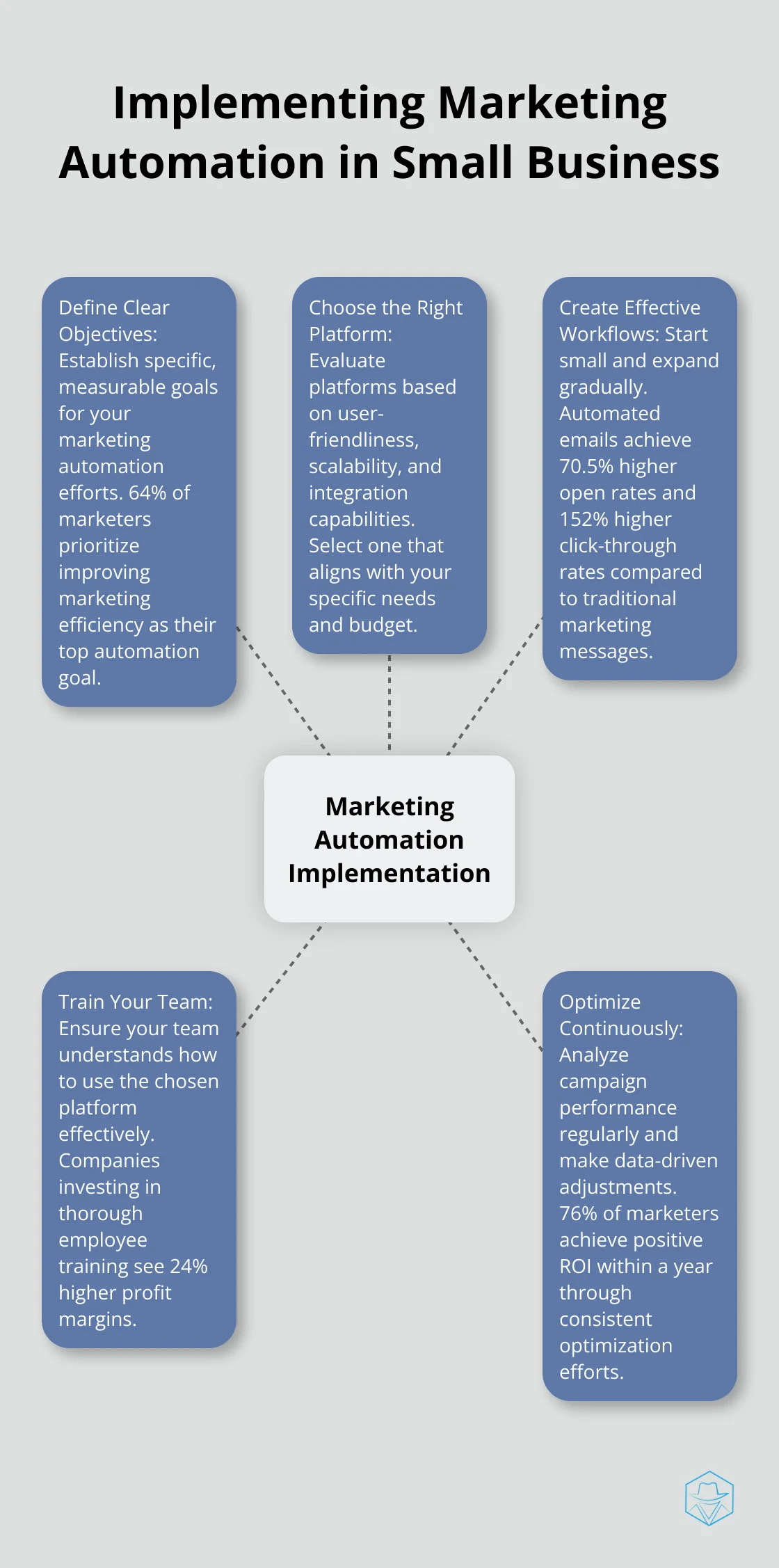Marketing Automation Tools for Small Businesses

Marketing automation can be a game-changer for small businesses. At Drop Cowboy, we’ve seen firsthand how these tools can streamline operations and boost growth.
This post will guide you through the top marketing automation tools and key features to look for. We’ll also share practical tips on how to implement marketing automation in your small business effectively.
Which Marketing Automation Tools Excel for Small Businesses?
Small businesses need powerful yet affordable marketing automation tools to compete effectively. We’ve evaluated numerous options and identified four standout solutions that deliver exceptional value for smaller organizations.
HubSpot: All-in-One Marketing Powerhouse
HubSpot offers a comprehensive suite of marketing, sales, and customer service tools. Their free CRM provides a solid foundation, while paid plans unlock advanced automation features. Small businesses benefit from HubSpot’s intuitive interface, extensive educational resources, and seamless integration between marketing and sales functions. HubSpot’s own data shows their customers see an average 181% increase in website traffic within one year of using the platform.

Mailchimp: Email Marketing Simplified
Mailchimp has evolved from a basic email tool into a robust marketing platform. Their user-friendly drag-and-drop email builder and pre-designed templates enable small businesses to create professional campaigns. Mailchimp’s free plan supports up to 2,000 contacts, making it an excellent starting point for growing businesses. Their 2022 report revealed Mailchimp customers achieved an average email open rate of 21.33% (significantly higher than industry averages).
ActiveCampaign: Automation for Customer Experience
ActiveCampaign offers advanced automation features at a fraction of the cost of enterprise solutions. Small businesses can create sophisticated, multi-step marketing workflows without extensive technical knowledge. Their platform stands out in lead scoring and segmentation, allowing for highly targeted campaigns. A study by Venture Harbour found businesses using ActiveCampaign experienced an average 30% increase in customer retention rates.
Drop Cowboy: Innovative Voice and SMS Marketing
Drop Cowboy offers a unique approach to marketing automation with a focus on ringless voicemail and SMS messaging. The Mimic AI™ technology allows businesses to create personalized voice messages at scale, often achieving higher engagement rates than traditional email campaigns. The Smart Delivery™ system ensures global reach (to over 80 countries), while the pay-per-successful-delivery model keeps costs predictable for small businesses. Drop Cowboy’s platform integrates seamlessly with existing CRM systems, making it an excellent complement to other marketing automation tools.
When selecting a marketing automation tool, small businesses should consider their specific needs, budget, and growth plans. Each of these platforms offers distinct advantages, and the right choice will depend on your unique marketing goals and customer communication preferences. As we move forward, let’s explore the key features you should look for in any marketing automation tool to ensure you make the best choice for your business.
What Features Make Marketing Automation Tools Effective?
Marketing automation tools can transform a small business’s marketing efforts. Certain features significantly impact success. Let’s explore the key capabilities to look for when selecting a tool for your business.

Powerful Email Marketing
Email remains a cornerstone of digital marketing. Tools should offer:
- Drag-and-drop editors
- A/B testing
- Dynamic content personalization
A study by Litmus found personalized email marketing can generate a median ROI of 122%. Choose platforms that provide detailed analytics on open rates, click-through rates, and conversions to refine your campaigns continuously.
Seamless CRM Integration
The ability to integrate with your existing Customer Relationship Management (CRM) system is essential. This integration allows for a unified view of customer interactions across marketing and sales. HubSpot reports that companies with strong sales and marketing alignment achieve a 20% annual growth rate. Select a tool that offers native integrations or robust APIs to connect with popular CRM platforms.
Advanced Lead Management
Effective lead scoring and nurturing capabilities convert prospects into customers. Systems should allow you to set up automated workflows based on user behavior and demographics. Marketo found that companies that excel at lead nurturing generate 50% more sales-ready leads at 33% lower cost. Try to find a tool that offers customizable lead scoring models and multi-touch attribution to measure campaign effectiveness accurately.
Comprehensive Analytics
Data-driven decision making optimizes your marketing efforts. Platforms should provide in-depth analytics and customizable reporting dashboards. According to Forrester, 74% of firms say they want to be data-driven, but only 29% succeed at connecting analytics to action. Choose a tool that not only presents data clearly but also offers actionable insights to improve your campaigns.
Multi-Channel Capabilities
Today’s customers interact with brands across multiple touchpoints. Your marketing automation tool should support various channels (including email, social media, SMS, and voice messaging). Look for platforms that allow you to create cohesive campaigns across channels, ensuring a consistent customer experience.
The best tool for your business will depend on your specific needs and goals. Take the time to thoroughly evaluate options and request demos or trials before making your final decision. Now that we’ve covered the essential features, let’s explore how to implement marketing automation effectively in your small business.
How to Implement Marketing Automation in Your Small Business

Define Clear Objectives
Before you select any tool, establish specific, measurable goals for your marketing automation efforts. Do you want to increase lead generation? Improve customer retention? Boost sales conversions? A study by Ascend2 found that 64% of marketers prioritize improving marketing efficiency as their top automation goal. Set concrete objectives to guide your implementation strategy.
Choose the Right Platform
With your goals in mind, evaluate different platforms based on factors like user-friendliness, scalability, and integration capabilities. Don’t automatically opt for the most feature-rich option; select one that aligns with your specific needs and budget. For example, if voice and SMS marketing are priorities for your business, consider platforms that excel in these areas (such as Drop Cowboy with its Mimic AI™ technology and global reach).
Create Effective Workflows
Start small and expand your automation efforts gradually. Begin with a simple welcome email series for new subscribers or a basic lead nurturing sequence. As you gain confidence, develop more complex workflows. Epsilon’s research shows that automated emails achieve 70.5% higher open rates and 152% higher click-through rates compared to traditional marketing messages.
Train Your Team
Ensure your team understands how to use the chosen platform effectively. Allocate time and resources for comprehensive training. Many automation tools offer extensive documentation and support resources-take full advantage of these materials. A report by Training Magazine reveals that companies investing in thorough employee training see 24% higher profit margins.
Optimize Continuously
Marketing automation requires ongoing attention and refinement. Analyze your campaign performance regularly and make data-driven adjustments. Try A/B testing different elements of your campaigns (from subject lines to send times). The Marketing Automation Trends Survey found that 76% of marketers achieve positive ROI within a year, but this often necessitates consistent optimization efforts.
Marketing automation enhances your marketing efforts without replacing the human touch. Use automation to handle repetitive tasks, allowing your team to focus on strategy and creativity. With a thoughtful approach, marketing automation can significantly boost your small business’s marketing effectiveness and drive overall growth.
Final Thoughts
Marketing automation has revolutionized small business operations, offering powerful tools to streamline processes and drive growth. Drop Cowboy stands out with its innovative Mimic AI™ technology and global reach, providing personalized communication at scale. Small businesses can achieve impressive results in lead generation, customer engagement, and sales conversions by selecting the right platform that aligns with their specific needs and goals.
To implement marketing automation effectively, businesses should start with clear objectives and choose a platform that fits their requirements. Creating effective workflows, investing time in team training, and continuously optimizing campaigns based on data and insights are essential steps. The world of marketing evolves rapidly, making automation a necessity for businesses aiming to thrive in today’s competitive landscape.
Small businesses should not delay in adopting marketing automation tools and techniques. The transformative impact on business operations and growth potential becomes evident soon after implementation. By embracing these innovative solutions, small businesses position themselves for long-term success and sustainable growth in an increasingly digital marketplace.
blog-dropcowboy-com
Related posts

June 27, 2025
Cold Calling Dialer: Boost Your Outreach Success
Boost outreach success with a cold calling dialer. Discover how technology can improve efficiency and connect with prospects effectively.

May 28, 2025
How to Choose the Best CRM System for Recruitment
Select the ideal CRM system for recruitment. Optimize your hiring process with informed choices and boost team efficiency effortlessly.

April 21, 2025
Boost Sales & Engagement | SMS & Ringless Voicemail Marketing App for Shopify
Boost sales & engagement with our top SMS & ringless voicemail marketing tool, available on Shopify App Store. Maximize customer outreach effortlessly.

March 26, 2025
Pipedrive vs HubSpot: Which CRM is Right for You?
Compare Pipedrive vs HubSpot to find your ideal CRM. Explore features, pricing, and user-friendliness to make an informed choice for your business.

September 3, 2025
Why Message Localization is Crucial for Global Campaigns
Boost international impact by using global message localization. Connect effectively with diverse audiences and enhance your campaign’s reach.

May 27, 2025
Bing Ads vs Google Ads: Which Is Better for Your Business?
Compare Bing Ads vs Google Ads to find the best fit for your business, offering insights, pros, and cons for smarter marketing decisions.